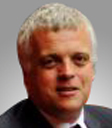Global Speakers

Michael Keppell
Former Pro Vice-Chancellor Learning Transformations
Swinburne University of Technology
As Pro Vice-Chancellor, Learning Transformations Michael focuses on institutional initiatives that will enhance teaching and learning at Swinburne University of Technology. His primary focus is to increase the quality of teaching across all modes of teaching (face-to-face, blended and online). His goal is to create and lead a sustainable program of learning innovation which enables Swinburne to thrive in an environment of constant change.
The Learning Transformations Unit is focused on professional development across the University. Their mission is to transform practice across the faculties by inspiring, enabling and empowering teaching staff to develop capacity and capability in innovative teaching and learning. Michael oversees a number of portfolios including redesigning learning spaces, blended learning, learning design, authentic assessment, scholarship, personalized learning and open education.
Michael was Executive Director, Australian Digital Futures Institute at University of Southern Queensland from October 2012 until March 2015. Prior to this, he has a long professional history in higher education in Australia, Canada and Hong Kong and has worked at six different universities.
His research focuses on learning design, digital futures, learning spaces, blended learning, learning-oriented assessment, authentic learning, leadership and transformative learning using design-based research. He is a Life Member of ascilite.

Glenn Withers
Professor of Economics
Australian National University
Glenn Withers is Professor of Economics at the ANU and Chair of Blended Learning International. He is also Visiting Professor at UNSW and Tongji University in Shanghai. He was previously Chief Executive of Universities Australia, and has consulted widely for government, the community and private sectors, in Australia and overseas. Professor Withers has a Harvard PHD, and an AO for development of the Australian immigration points system. He is President of the Academy of Social Sciences in Australia. Glenn Withers’ most recent book is The Cambridge Economic History of Australia (with Simon Ville).

Bob Fox
Academic Lead Curriculum
University of New South Wales
Professor Bob Fox, Academic Lead Curriculum, Office of the Pro Vice-Chancellor (Education) at The University of New South Wales (UNSW), Australia. He holds concurrent appointments as Professor (Hons), Faculty of Education, University of Hong Kong (HKU) and Professor of Innovation in Higher Education (AD), School of Education, UNSW. Professor Fox was awarded HKU’s University Teaching Fellowship (UTF) for excellence in teaching. Between 2000-2013 he was Associate Professor and Deputy Director, Centre for Information Technology in Education, Faculty of Education at HKU with one year at the Chinese University of Hong Kong as Professor and Associate Director, Centre for Learning Enhancement and Research before returning to HKU in 2009. He was also A/Dean (Learning Environments), Faculty of Education, HKU for the last two and a half years at HKU. Before working at HKU he was Associate Director and Senior Lecturer of the Centre for the Advancement of Education at Curtin University, Australia for 13 years; Senior Lecturer at Hong Kong Vocational Training Council for four years; a TEFL teacher for five years in England, Hong Kong and Spain and further education Lecturer for two years in England.

Rob Howe
Head of Learning Technology and Media
The University of Northampton
Rob is Head of Learning Technology at The University of Northampton. Accepted to CMALT and IADIS in 2007. Awarded University teaching fellowship in 2008. Achieved Senior Fellowship of the HEA in 2014. Has led four national projects (HEA BITE; HEA TIGER; JISC e4L and ELESIG – Midlands) in addition to local manager for the TLTP TALENT project and 3 internally funded projects. He has 2 internationally refereed conference papers, 2 journal articles, over 25 other workshops, conference papers and reports since 2000. 3 invited international keynotes since May 2010.

Kayoko Kurita
Associate Professor
Center for Research and Development of Higher Education, University of Tokyo
Dr. Kayoko Kurita is an Associate Professor at Center of Research and Development in Higher Education, The University of Tokyo (UTokyo). She is a board member of Japan Association of Educational Development (JAED), a delegate of Japan Association for College and University Education. She has devoted much of her professional career to research at the quality assurance of higher education and to engage in developing and implementing a variety of programs for Educational Development and Graduate Students for Professional Development (GSPD) like a workshop for creating Teaching Portfolios. She has been in charge of “UTokyo Future Faculty Program” for graduate students and faculty; which has earned good reputation as a GSPD program in Japan. Additionally, she provided a MOOC titled “Interactive Teaching” for all educators. Now she is pursuing sustainable learning community for online or face to face course setting.

Lui Yoshida
Project Assistant Professor of the Division for Active Learning and Teaching
University of Tokyo
Dr. Lui Yoshida is an educational developer and a Project Assistant Professor of the Division for Active Learning and Teaching at Komaba Organization for Educational Excellence (KOMEX) at The University of Tokyo (UTokyo). Before joining KOMEX, he researched in Biomedical engineering and got his Ph.D in Science at UTokyo and he was engaged in a graduate student professional development program called “UTokyo Future Faculty Program” at the Center for Research and Development for Higher Education at the UTokyo. Now, he is engaged in promoting effective active learning on the campus and holds educational development workshops and class consultation service at UTokyo. Addition to the work at UTokyo, as his research, he developed online collaborative learning system “LearnWiz” to provide wide opportunities for faculty members to improve teaching skills.

Koh Noi Keng
Senior Lecturer; Director of the Centre for Financial Literacy
National Institute of Education, Nanyang Technological University, Singapore
Dr Koh Noi Keng, Director of the Centre for Financial Literacy, at the National Institute of Education (NIE), an institute of the Nanyang Technological University (NTU) in Singapore, has led financial literacy programmes and research in schools since its launch in 2007. After 15 years’ experience as a teacher, a school leader, and a Ministry of Education HQ Senior Education Officer, Dr Koh joined NIE to coordinate and conduct the post graduate courses to prepare teachers to teach Economics, Business and Accounting. She has published books and teacher resource training materials and also created several e-portals for building networked learning communities for educators and advocates flipped instructions.
Dr Koh has created useful financial literacy curriculum, resources and mobile applications for engaging youth in learning financial education and for learning business and accounting subjects. She is editor and author for the inaugural International Handbook of Financial Literacy by Springer, published in 2016. A much sought after keynote speaker at international conferences, she has been invited to speak at BETT London, India, Spain, USA, Malaysia, Australia, Kazakhstan, Thailand and Korea. She has spearheaded training programs, research and events to create awareness and empower teachers to promote financial literacy to students in schools. The breakthrough impetus saw a quantum leap in the rise of the number of schools (91% secondary schools, 72% primary schools and 90% of Junior colleges in Singapore) implementing financial literacy programs. She is also the principal investigator for numerous research grants and is currently involved in a research on networked learning community and another on technology-rich authentic learning environment. She is also Advisor to the Association of Commerce Educators Singapore (ACES) and the 5,000-member strong Nanyang Technological University Investment Club (NTU-IIC).

Romy Lawson
Deputy Vice Chancellor – Education
Murdoch University
Romy Lawson is the Deputy-Vice-Chancellor (Education) at Murdoch University having previously held the positions of Director of Learning, Teaching & Curriculum at the University of Wollongong and Associate Dean (Teaching & Learning) at James Cook University. She has been actively involved in teaching and learning development in higher education for over 20 years in both the UK and Australia. She led the National OLT Strategic Priority Project: Hunters & Gatherers: Strategies for Curriculum Mapping and Data Collection for Assurance of Learning (assuringlearning.com), and has been a team member in other ALTC funded projects including: Embedding Professionally Relevant Learning in Business Education; and Facilitating staff and student engagement with graduate attribute development, assessment and standards in Business Faculties. In 2013 she was awarded a National OLT Teaching Fellowship for work on Curriculum Design for Assuring Learning.

Denise Kirkpatrick
Deputy Vice Chancellor and Vice President (Academic)
Western Sydney University
Professor Denise Kirkpatrick is Deputy Vice-Chancellor and Vice President (Academic) at Western Sydney University and is responsible for providing senior level leadership of the University’s academic portfolio, International, oversight of the Western Sydney University College and newly established Western Sydney University International College.
Denise has worked as a senior executive in universities in Australia and the United Kingdom. She has led distance education and strategy at leading distance education universities and has extensive experience leading innovation in learning and teaching, eLearning and quality assurance in distance and face to face contexts.
Denise has a PhD in learning and teaching and has worked as a consultant in Australia, Europe, South-East Asia, Africa and the Middle East. She has been an international auditor for a number of Quality Assurance bodies. She researches and publishes in the fields of open, distance and e-learning, and quality in Higher Education.

Lucy Schulz
Director of the Cloud Campus
Deakin University
Lucy Schulz is Director of Deakin University’s Cloud Campus. Prior to this she was Program Director for the LIVE Agenda, Deakin University’s vision for 2020 overseeing a range of projects focused on enhancing the student experience at each stage in their journey.
Before commencing at Deakin University Lucy was Executive Director: Regulation and Review at TEQSA, the Australian regulator for higher education.
Lucy has lead numerous strategic projects including large scale business change and technology projects particularly in university administrative and service areas. She is very focused on creating value for customers – perhaps because of all those hospitality jobs when she was young. Added to this is her passion about the value and difference an education makes.
Lucy has worked in the higher education sector for a number of years in both academic and administrative positions, as well as in higher education regulation. She has a number of qualifications including in Communication Studies, Legal Studies, Education, and Management Research. She has also completed the Company Directors diploma and is a Fellow and Meritorious Service Award winner of the Association for Tertiary Education Management (ATEM).

David Sadler
Deputy Vice-Chancellor (Students and Education)
University of Tasmania
Professor David Sadler is Deputy Vice-Chancellor (Students and Education) at the University of Tasmania. He heads up a large Division whose vision is to enable quality learning and student experiences at the University of Tasmania. He is responsible for the development and implementation of strategies aimed at achieving the Divisional and broader University of Tasmania vision and priorities as outlined in the University’s Strategic Plan, Open to Talent.
Professor David Sadler joined the University of Tasmania in January 2011 from the UK where he was one of the Directors of the Higher Education Academy (HEA). The HEA has responsibility to develop excellence in learning and teaching and works to achieve the best student experience. He led many initiatives in the areas of student engagement; education for sustainable development; open education resources (OERs); technology enhanced learning and increased social inclusion in Higher Education. These remain his passions and inform his approach to a student-centred focus to learning and teaching at the University of Tasmania.
David is a UK National Teaching Fellow in recognition of his work on innovative role-play teaching techniques in the social sciences and held two Jean Monnet awards for his teaching. In November 2011 David was appointed to the national Strategic Advisory Board of the Australian Government’s Office for Learning and Teaching (OLT). He is also Deputy Chair of the OLT Grants Committee. David is also a member of the Universities Australia (UA) Deputy Vice-Chancellors (Academic) executive group, the UA Standing Group on Quality, and the UA representative on the Higher Education Equity Group.

Peter Kilcoyne
ILT Director
Heart of Worcestershire College
Peter has worked in Further and Higher Education in teacher, advisor and management roles for over 30 years. He is currently Director of Information and Learning Technology at Heart of Worcestershire College. The college is a sector leading organization in Digital Learning and has recently won the Times Educational Supplement and Association of Colleges national awards for their work in this area.
Peter set up the Blended Learning Consortium 18 months ago and in this short time it has grown to over 80 colleges working together to co-fund and co-create online learning resources.
Peter also has extensive experience of working in Africa as a consultant for Computeriad International providing onsite training and support at Universities in Zambia, Nigeria, Liberia, Kenya and Ethiopia in the use of e-learning.

Pauline Farrell
Director, Education Leadership and Student Experience
Swinburne University of Technology
Pauline Farrell is a passionate advocate for student retention, student experience and student led learning. Her research interest has recently evolved into National workforce development particularly in relation to the power of disruptive and transformative technologies across large multinational organizations.
She is equally driven to achieve exponential change in the teacher experience through setting aspirational benchmarks in innovation, delivery and assessment. Pauline has worked in the school sector as a teacher and consultant, university as a lecturer, TAFE as a teacher, manager and executive and in corporate as a consultant and executive. Her career highlights include: Author of eBusiness Now, Pearson Education, Winner of UMTC Melbourne University PH’d scholarship, DEET T.R.I.P. fellowship, and Multiple Award winner in learning innovations, elearning, and leadership.
Recent experience include Executive Manager for Blended learning Solutions at Box Hill Institute, Director of Education Leadership and Student Experience within Swinburne University: PAVE and Director of Learning Innovation at SUT:PAVE.

Linda Corrin
Senior Lecturer in Higher Education
University of Melbourne
Dr Linda Corrin is a Senior Lecturer in Higher Education in the Williams Centre for Learning Advancement at the University of Melbourne. She has been involved in educational technology-related research and academic development in higher education for the past 16 years. In her current role, she provides support for curriculum development, delivery and assessment to staff in the Faculty of Business and Economics. Linda’s research interests include students’ engagement with technology, learning analytics, feedback, and learning design. Currently, she is working on several large research projects that explore ways that learning analytics can be used to provide meaningful and timely feedback to academics and students. Linda is chair of the University of Melbourne’s Learning Analytics Research Group and co-founder of the Victorian and Tasmanian Learning Analytics Network.

Mark Robertson
Learning Technology Partner
Cengage
Mark Robertson is a Learning Technology Partner with Cengage.
He has spent the last seven years pursuing technology within education, having worked as a Lecturer at Box Hill Tafe, as eLearning Lead for the Australian and New Zealand College of Anaethetists, and as a Learning consultant/Education solutions specialist for Kangan Bendigo Tafe. He has considerable experience in instructional design, project management, learning management systems, content management systems, educational technology, eLearning, course design and multimedia production. He has conducted numerous workshops and was invited to speak at the recent iDesignx conference in February 2017.
Now, he is engaged in designing and promoting the use of next generation learning environments to the higher education and vocational sectors. He is also passionate about augmented and virtual reality and is currently working with various partners to integrate mixed reality content with existing traditional models.

Chanaka Kannangara
Director of Higher Education and Research Industry
Oracle Corporation
Chanaka Kannangara, the Director of Higher Education and Research Industry at Oracle Corporation. With over 20 years in ICT industry in various senior roles ranging from R&D, Services and Management, Chanaka brings a depth of specialist knowledge aligned to current and future business needs of the rapidly changing industry landscape. He has a long involvement education and research in ANZ and US with strong senior executive relationships with Institutions and Industry bodies of the sector. Chanaka has been a trusted technology partner for many institutions for their transformational programs to address complex business issues and grow. He holds BEE and MEE (Research) degrees from Victoria University.

Danny Munnerley
Head of Blended Learning and Innovation
James Cook University
Danny Munnerley is the Head of Blended Learning and Innovation at James Cook University in Townsville, Australia. He has a background in Fine Arts, Design, Education and Technology and has lead many educational projects and programs within higher education and for the private sector in Australia, UAE and UK.
He is passionate about rethinking global education, creating new places to study and developing rich learning experiences that help students connect with each other online and on campus. Danny has developed approaches that blend space design and pedagogical frameworks to deliver student experiences that encourage creativity, innovation and entrepreneurial activity.
His current work is future focused and includes the design and development of learning environments suitable for students in 2020. Through a series of digital transformation projects his teams are managing a whole of university LMS migration and adoption of a new media capture and delivery systems that will provide learning experiences that works seamlessly across the physical and mobile world.

Teri Balser
Dean of Teaching and Learning
Curtin University
Professor Teri Balser is Dean of Teaching and Learning for the Faculty of Science and Engineering at Curtin University. Prior to her arrival in Australia, her career has taken her from a Ph.D. in soil microbiology from the University of California at Berkeley, to postdoctoral research in ecosystem ecology at Stanford University, to being a Faculty member at the University of Wisconsin Madison, and finally Dean of the College of Agricultural and Life Sciences at the University of Florida.
Professor Balser has an international recognition as an accomplished research scholar, and is also widely known in higher education as a change agent and leader in STEM. She is a co-founder of the Society for Advancement of Biology Education Research (SABER), a National Vision and Change Fellow with the Partnership for Undergraduate Life Sciences Education (PULSE), and was a Fulbright-Nehru Distinguished Chair to India in 2015 to help build capacity at the national level for pedagogically advanced and responsive STEM education. She has long been an active advocate, speaker, and workshop facilitator for leadership and gender equity across the sciences and engineering.

Joseli Macedo
Head of School of Built Environment
Curtin University
Professor Macedo is an urbanist who has focussed her research on human settlements, particularly in the developing world. She has taught in architecture and urban and regional planning programs for 15 years and has published on the topics of housing, land policy, environmental conservation, urban design and sustainability. Joseli has recently been appointed as Head of the School of Built Environment at Curtin University.

Paul Bonnington
eResearch Director
Monash University
Prof Paul Bonnington is the Director of the Monash eResearch Centre, Monash University, Australia, and a Professor in the School of Mathematical Sciences., eResearch Director, Monash University.
In 2005, Prof Bonnington spearheaded New Zealand’s eResearch Infrastructure project BeSTGRID, and was recruited by Monash University to lead the Monash eResearch Centre in 2008.
The Monash eResearch Centre’s role is to build collaborations between research disciplines, nurture eResearch developments and to build bridges between researchers and research infrastructure providers. Since 2010, the Monash eResearch Centre has been selected to host over $20M of Australia’s federally-funded national eResearch Infrastructure for specialized high-performance computing, research cloud services and data storage and data management: the National Computational Infrastructure Specialist High Performance Computing Facility (http://www.massive.org.au), and nodes of the national NeCTAR Research Cloud (http://www.nectar.org.au) and Research Data Storage Infrastructure (http://www.rds.org.au). The innovations of the centre, particularly with respect to cloud infrastructure, real-time instrument data processing, and virtual laboratories, is internationally regarded. It is a partner centre of excellence for many technology companies.
